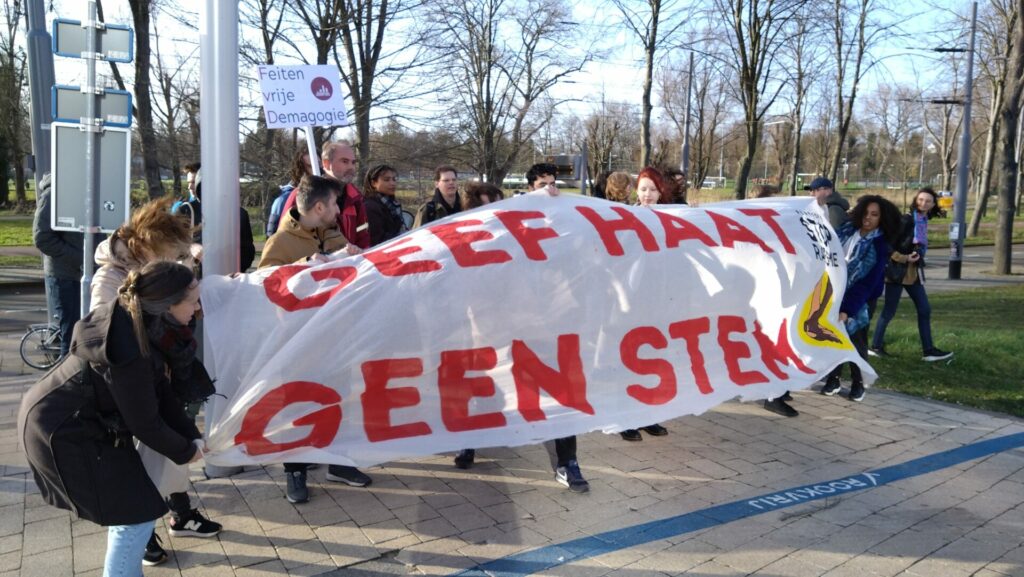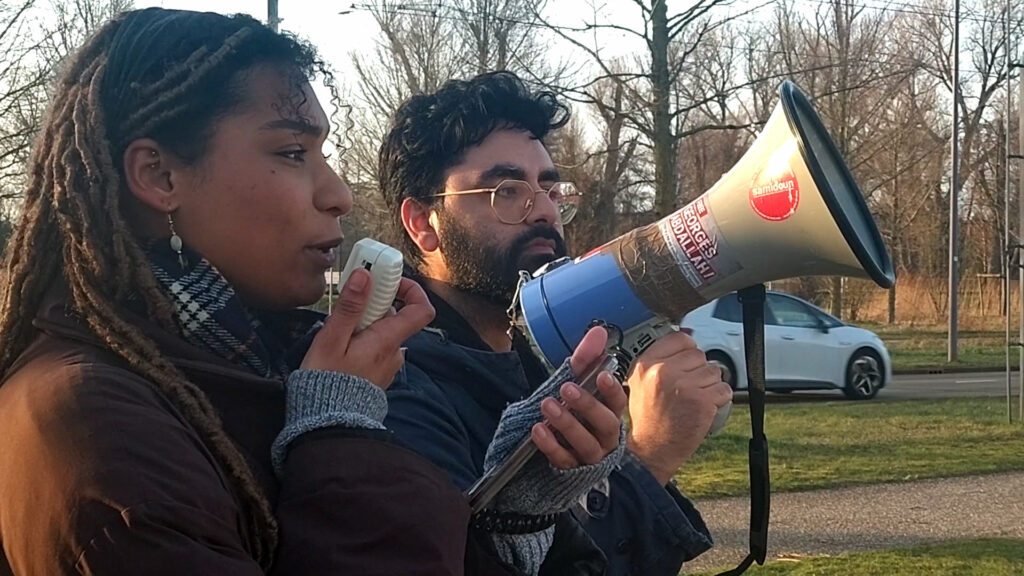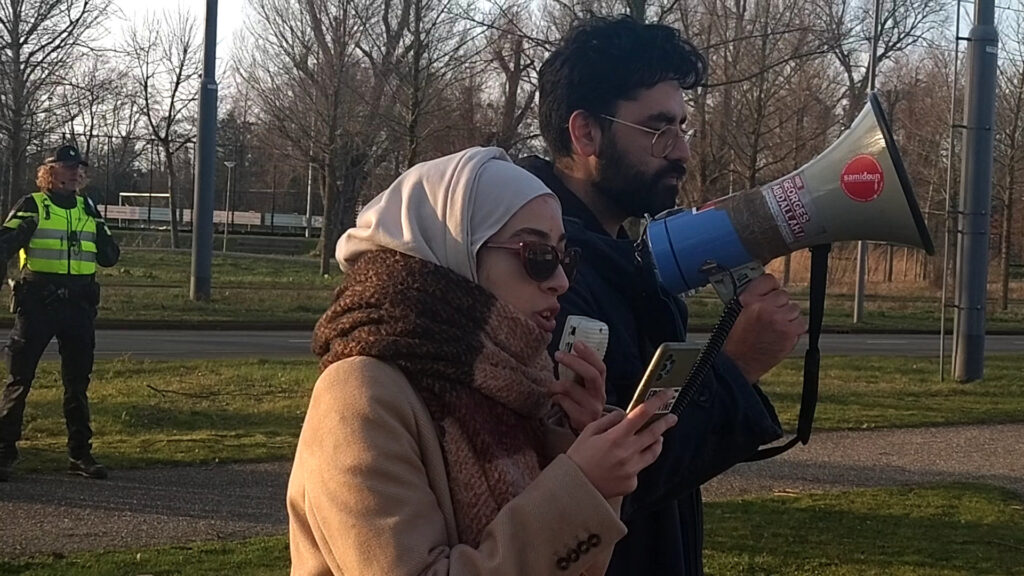Inspirerende speeches bij het protest tegen racisme bij het verkiezingsdebat op de Erasmus universiteit

Zo’n vijftig mensen demonstreerden afgelopen maandagmiddag in Rotterdam tegen extreem-rechts en racisme bij het verkiezingsdebat op de Erasmus universiteit. De actie was georganiseerd door het Platform Stop Racisme. Hier een kort verslag en de twee (Engelstalige) speeches die gehouden werden.
We begonnen met het roepen van leuzen en een korte demonstratie het campusterrein op. “Geef haat geen stem!” Al snel werden we door de politie gestopt. De campus is privéterrein. We mochten er flyeren en staan met spandoeken, maar dan wel in stilte. Anders zouden we de studenten en colleges storen. Dat was natuurlijk onzin, want het was rond 17:00 uur en de meeste studenten waren al weg. Toch hebben we ons er een poosje aan gehouden, ook om flink te kunnen flyeren.
Na pakweg een half uur gingen we toch geluid maken, klappen en leuzen roepen, en vertrokken we demonstrerend van het campusterrein naar de openbare weg langs de aula waar de politici zouden gaan optreden. Daar hielden OSA en Khadija hun toespraken, en riepen we leuzen. Helemaal los gingen we vanaf 18:17 uur toen het debat begon. Na 20 minuten herrie en zeer diverse leuzen was het voldoende. Het was duidelijk dat in ieder geval sommigen binnen ons gehoord hadden.
Eric Krebbers

De speech van OSA
Dear all,
My name is OSA. Today, I stand before you as a student at the Erasmus university to speak out against hate, of all kinds, and the choice of university staff and students to host and platform racist and right-wing ideas and politicians on the Erasmus campus.
Unfortunately, many people and students on this campus and beyond question whether a protest like this is necessary. Are the things we speak out about today really important issues to be addressed or are we all just making a fuss?
Racism and fascism, however, are not just relics of the past. They are very much alive today, and it poses a serious threat to us that needs to be continuously scrutinized. We see it in the rise of authoritarian regimes, the resurgence of far-right movements, and the increasing polarization of our political discourse and policies. We see it in the demonization of minority groups, the suppression of free speech, and the erosion of democratic values. Such is even thought in the education I receive here.
It was two days ago that Geert Wilders gave a speech at the boerenprotesten at the Malieveld in The Hague. At this protest, sponsored by many corporations looking to benefit from the further deterioration of our climate, he called for a shift of votes, further to the right, and proclaimed this as the only way to save our nation. Saved in a way that means violently clinging on to privileges that exclude all that does not fit Wilders’ description worthy. In a way that our earth can not sustain and is making the borders around the world a hellish landscape. Today we invite him as an honored guest? I say no thank you.

I asked people in my environment: friends, and people that are vital to places and services I am dependent on, and asked them their thoughts on having a debate like this on campus and whether they would like to attend the protest. Some things I heard many times over:
I’m black, and I can’t go to a protest like that. Are you sure you want to go? I do not even keep track of politics anymore, it is too much for me and there is nothing productive. I can add: politicians are not there to represent me.
A friend of mine also noted: how explicit must the racism by Wilders and Rutte become before we draw a line? Time and time again we have “debates and conversation”, inviting the most harmful ideas to the table like we are discussing small matters of disagreement. What we are doing, in reality, is normalizing a world where the harmful is the status quo. Little by little, viewpoints that were extreme have become part of the center.
People are fed up after 12 years of Rutte and for some a lifetime of right-wing governments. Years that have seen the destruction of lives, because ethnicity was deemed a risk factor by the tax authorities, further ethnic profiling practices by the police, a crackdown on the ability of the youth to access mental care, and more people struggling to house themselves. Many that have arrived in the Netherlands and Rotterdam, like parts of my family that have migrated here from Nigeria, have encountered this culture as the way we do things here and have had to adjust.
As a student, I’d hope things are different on campus. I believe the university should be a place of learning and growing on an equal playing field, where ideas are debated and we learn together. It is not a place for the promotion of ideas that question the livelihood and well-being of its own students. While I can applaud an attempt to be politically engaged, I do not believe the students and staff responsible for organizing the debate today have created a space for critical thinking on how we and the world can be better.
But then again, it was also this university, that saw the removal of its students at a peaceful protest by the Rotterdam police, and is known to have a well-documented history of ethnic profiling. It was this university that told students at a peaceful protest their safety could not be guaranteed. It was heartbreaking for me to hear from friends and fellow students how these events have made them feel unsafe to speak their opinion and join others in advocating what they believe is right.
The hate we protest against today thrives in an environment of fear and uncertainty. It preys on the vulnerable, it marginalizes, and it seeks to exploit our differences for its own gain. And the university showed again and again that they are willing to be complicit in this.
But we know another way of doing things is possible. We know that a university, a city, and a world that truly stands for racial equity and embraces its diversity is not beyond imagination. Many of us create these spaces in our daily lives.
The trajectory of this university, the city, and our lives is to be shaped by us and not imposed upon us. We resist racism, and fascism by organizing in solidarity, empathy, and today in BEING A PAIN IN THEIR ASS. We make them see us, we make them hear us and we make them change, while I know in the process others are inspired to speak out as well.

De speech van Khadija van Palestine Solidarity Rotterdam
Spring is the season of resistance.
And resistance is our legacy. It is our role as students to protect knowledge from fascist ideas. And I’m not talking about the elitist concept of knowledge or students. I mean all of those that in the daily life are educators and educated. In every field and every form.
The perpetuation of racist propaganda under the guise of a political debate has been a beloved tool in European politics lately. Freedom of speech seems to always be relevant when they wanna be racist. But freedom of speech that’s anti-capitalist, anti-fascist and anti-racist, is not. It’s relegated to “outside campus grounds”. Well, if one type of debate is allowed in, and another is not, I can tell you that’s not freedom of ideas nor of speech.
Resistance is not allowing hateful ideas to spread. Resistance is demanding the university to not allow renowned racists and islamophobes to “debate”.
Geert Wilders’ presence in here reflects the university’s interests. Hosting a debate by conservative parties, who clearly enjoy spreading racist rethoric, is a demonstration of what the university considers a “political debate”. Is this how you are preparing your students for the elections? And for the student groups behind this: is this where your education brought you?
The police’s presence here is another reminder. To protect these “free ideas”, they are willing to resort to violence. To allow their hateful rethoric to spread, the police is a necessary part.
We are resisting this racist structural power. We are students, workers and organisers, and we activate against institutionalised fascist ideas.
I’m here because I believe in solidarity. Because that’s the education and knowledge and research I care about. solidarity for the people, the oppressed and those that are at the mercy of these “political debates”.
